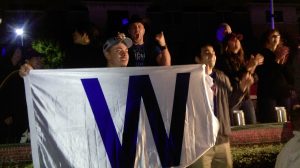
It was a day of distraction and anticipation, followed by a beaming burst of hope, which gave way to stomach-churning optimism, only to have it descend into deja vu despair.
And then, of course, the grounds crew pushed the tarp onto the playing field at rainy Progressive Field in Cleveland.
I nestled into a (relatively) quiet corner of FitzGerald’s, the Berwyn night club, and pulled up my Facebook page: “Whoever sees the four horsemen first… please send us a quick heads-up!!”
I have read Revelation, the last book of the Bible that foretells the Four Horsemen of the Apocalypse, and didn’t recall any mention of the Indians vs. Cubs, or a Jon Lester wild pitch, or even Joe Maddon’s curious handling of the pitching staff. Just the same, this had the feeling of end times.
I had arrived at the place to be for Cubs fans in the near western suburbs of Chicago–FitzGerald’s, along Roosevelt Road just south of Oak Park—in the bottom of the sixth inning. Moments earlier, retiring Cubs catcher David Ross had slugged that redemptive home run over the center field wall to push Chicago’s lead to three, 6-3.
During my drive to FitzGerald’s in the bottom of the fifth inning, I heard Cubs’ play-by-play man Pat Hughes describe the Lester wild pitch that ricocheted off Ross’s mask, and the ensuing frenzy of two Indians coming in to score on the play. Dread crept in, but Ross’s story-book home run kept it at arm’s length.
That’s how I had seen most of these playoffs, extending my arm to watch the action on my smartphone or iPad.
But this denouement—this I had to see in a proper setting, around other Cubs fans, with a humongous screen to take it all in. The same idea had occurred to hundreds of others, spread out among three big screens situated inside the main building, under a tent, and in the parking lot.
Born and raised in the Boston area, I am and forever will be a Red Sox fan first. But having spent 30 years in Chicago, the Cubs (along with the White Sox) have inspired an allegiance sealed by a kindred connection, all three franchises having suffered generations of futility, near-misses, and infamous bad luck.
In 2004, the Red Sox broke through. The next year was the South Side team’s turn. Now it was the Cubs’ turn—at least it sure seemed so with two outs in the 8th inning. Lester, the former Red Sox World Series winner pitching on fumes and two days’ rest, induced a ground ball from Jose Ramirez. Onto the ninth inning!
Only, shortstop Addison Russell couldn’t quite get a handle on it. Moving quickly to his left, he actually over-shot it with his glove. Not an error, but a makeable play that hadn’t been made. In came flamethrower Aroldis Chapman to shut the door.
Only, the Indians kicked it wide open. A double drove home one run, and then noted speedster and light-hitting Rajai Davis came to the plate. He worked the count to 2-and-2, fouling off two pitches as he choked up on his bat like some ballplayer plucked from the game’s dead-ball era more than a century ago.
Before the next pitch, while streaming video via Facebook Live, I helped lead a 17-second chant of “Let’s Go Cubs!” that gradually worked its way through the nervous assembly. The chant halted as Chapman dealt, Davis swung from his heels, and the ball shot toward the left-field corner. Would it be far enough? Would it be fair?
It was eminently unfair. Improbably, impossibly: a two-run home run. A collective groan ascended from the parking lot. A 6-6 tie never felt like such a hole to climb out of.
“Oh my goodness,” I said. “You’ve got to be kidding me.”
Watching Davis circle the bases, right arm raised and thumping his chest, I trekked down another hole—to 13 years ago, when the Cubs self-destructed in the 8th inning of Game 6 of the National League Championship Series.
Back then, on assignment as a journalist, I went to the lobby of the YMCA across the street from my home to capture fans’ reaction to that squad’s clinching of a World Series. Then came the Bartman incident, followed by Alex Gonzalez’s muffed double-play grounder, and a much different story emerged—the Cubs’ infamous meltdown.
And here we were, in the waning moments of November 2, 2016, and as Yogi Berra would say, it felt like déjà vu all over again. Neither team scored in the ninth, though it had more than a little drama. The Cubs failed to get a runner home from third base with one out; the Indians’ Jason Kipnis gave a huge scare with a long drive that initially appeared to be a home run but curved foul.
Onto extra innings. But first came that rain, and the 17-minute delay during which time the Cubs regrouped behind a pep talk from slumping outfielder Jason Heyward.
What happened on the field next has already been exhaustively chronicled and will be re-visited innumerable times for years to come. At FitzGerald’s, we hung on every pitch, rejoiced in the Cubs’ two-run rally, wondered if they would rue not scoring at least three runs, and clung to this newfound hope.
Thirteen minutes before midnight, up now by only one run, the ground ball rolled to Kris Bryant at third base. His throw to Anthony Rizzo was on the money. Déjà vu despair dissolved, fully, finally, mercifully and loudly, among the throng.
Taking its place was a special sort of unhinged delight, the type that has been bottled up for more than a century.
During various late-game segments of the Cubs’ Game 7 World Series victory, including the final out and the ensuing celebration among fellow fans, I shot video of the FitzGerald’s scene. You can find it on my personal Facebook page: www.facebook.com/mwbaron.
Related Posts:
1998: A Storied–Um, Steroid–Summer
Irony, Tragedy in Photography of Sosa & Bonds
